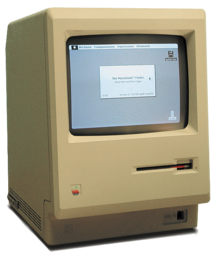1984 (commercial)
| Movie | |
|---|---|
| Original title | 1984 |
| Country of production | United States |
| original language | English language |
| Publishing year | 1984 |
| length | 1 minute |
| Rod | |
| Director | Ridley Scott |
| script |
Steve Hayden , Lee Clow , Brent Thomas |
| production |
Jay Chiat , Lee Clow, Guy Day |
| camera | Adrian Biddle |
| cut | Pamela Power |
| occupation | |
| |
1984 is the title of a US commercial for the computer manufacturer Apple and the advertising agency TBWA . It was performed during Super Bowl XVIII in 1984 and promoted the Macintosh first produced at the time . The multiple award-winning spot is considered a milestone in the advertising industry. The one-minute commercial was directed by Ridley Scott .
1984 is based on the novel of the same name by George Orwell . In the spot, a young woman frees herself from her big brother . It ends with a reference to the Apple Macintosh and that 1984 will not be like the novel 1984 .
content
In a colorless and gloomy world, expressionless workers step in lockstep into a hall with a huge screen ( tele- screen ). The “big brother” speaks to them and extols the “union of thoughts”. Also shown is a young woman in sportswear running towards the screen. She carries a large sledgehammer in her hand; she is being followed by several people (the thought police ). The woman strikes out to break free and hurls her hammer against the screen, which breaks and shines brightly on the audience.
An off-voice announces:
“On January 24th, Apple Computer will introduce Macintosh.
And you'll see why 1984 won't be like '1984'. "
“On January 24th, Apple Computer will introduce 'Macintosh'.
And you will see why 1984 won't be like '1984'. "
background

The nameless heroine of the commercial wears a top on which a Macintosh can be seen dimly - the only image of the advertised product in the film. It therefore stands for the Apple company. She is embodied by the hammer thrower Anya Major .
There are different interpretations of the Big Brother symbol: A speech by Steve Jobs indicates that this symbolizes the competitor IBM , for the makers of the commercial it embodies conformity in itself and is not limited to IBM.
The film had a budget of 900,000 US dollars (now equivalent to about 2.2 million US dollars, or 1,510,700 euros).
Steve Jobs and John Sculley were delighted with its effect and bought a minute and thirty seconds of advertising time at the Super Bowl. However, the board of directors was not convinced and therefore wanted to sell the 90 seconds they had already bought. But since only 30 seconds could be sold, the well-known one-minute version was created.
Awards
- 1984: 31st Cannes Lions International Advertising Festival - Grand Prix
- 1984: Clio Awards
- 1995: Advertising Age - Greatest Commercial
- 1995: Clio Awards - Hall of Fame
- 1999: TV Guide - Number One Greatest Commercial of All Time
- 2003: World Federation of Advertisers - Hall of Fame Award (Jubilee Golden Award)
- 2007: Best Super Bowl Spot
See also
In 2013, almost 30 years later, as part of the surveillance and espionage affair in 2013, an internal NSA presentation asked "who in 1984 could have imagined that Steve Jobs would be the real big brother and the zombies the paying customers".
Web links
- 1984 in the Internet Movie Database (English)
- Apple-1984. In: vimeo.com. Retrieved December 29, 2015 .
- Legendary Macintosh Ads: When 1984 Didn't Become 1984 - Computer | STERN.de. In: stern.de. Retrieved December 29, 2015 .
Individual evidence
- ^ CNN.com - Why 2006 isn't like '1984' - Feb 3, 2006. In: cnn.com. edition.cnn.com, accessed December 29, 2015 .
- ↑ Apple keynote from 1983 on YouTube
- ↑ 30 years of Macintosh: In 1984 Apple was still one of the good guys - computers | STERN.de. In: stern.de. Retrieved December 29, 2015 .
- ↑ Apple's "1984". In: tedfriedman.com. TedFriedman.com, accessed December 29, 2015 (American English).
- ↑ Philip H. Dougherty: ADVERTISING; ; Chiat Wins at Cannes For '1984' Apple Spot . In: The New York Times . June 26, 1984, ISSN 0362-4331 ( nytimes.com ).
- ^ Stuart Elliott: THE MEDIA BUSINESS: Advertising; A new ranking of the '50 best 'television commercials ever made. In: The New York Times . March 14, 1995, ISSN 0362-4331 ( nytimes.com ).
- ↑ The Mac Observer - TV Guide Names Apple's "1984" Commercial As # 1 All-Time Commercial! In: macobserver.com. Retrieved December 29, 2015 .
- ↑ Consumers Prefer a Greener Apple | Business | The Earth Times. In: earthtimes.org. Retrieved December 29, 2015 .
- ↑ Laura Poitras , Marcel Rosenbach , Holger Stark : Photo Gallery: Spying on Smartphones. In: Spiegel Online. SPIEGEL ONLINE, accessed on December 29, 2015 .
- ↑ NSA affair: "Champagne!" In: Spiegel Online. September 7, 2013, accessed December 29, 2015 .